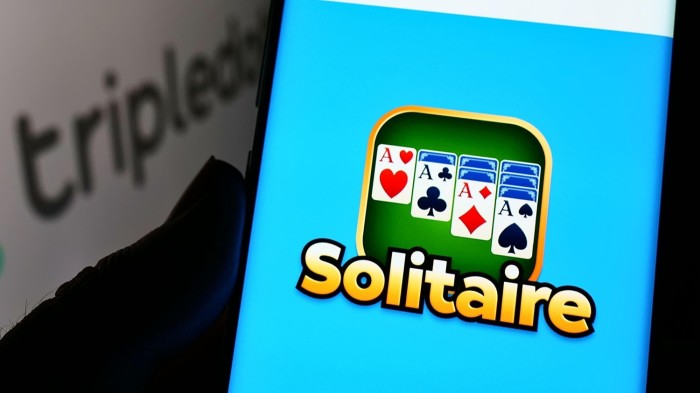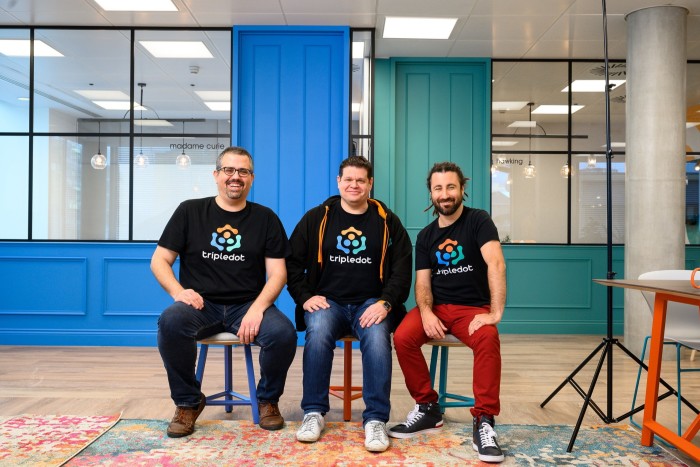Tripledot plays winning hand with ‘Solitaire’ to top FT1000

Roula Khalaf, Editor of the FT, selects her favourite stories in this weekly newsletter.
Search any app store for ‘solitaire’ and dozens of near-identical games will be listed. This enduringly popular single-player time-filler, also known as patience and Klondike, is the grandfather of the “casual” puzzle games that now dominate the download charts: it has been bundled in almost every version of Microsoft Windows for more than 30 years.
Yet one start-up, London-based Tripledot Studios, has turned this seemingly commoditised property into the foundation of a highly profitable business with more than 400 staff, about 50mn monthly active users and “several hundred million dollars” in revenue last year, according to its founders. As a result, Tripledot tops the FT-Statista ranking of the fastest-growing companies in Europe.
“Our Solitaire app looks very similar to thousands of other Solitaire apps,” says Akin Babayigit, Tripledot’s co-founder and chief operating officer. “There isn’t one thing that is done very differently: there are just 100 things that we do maybe 1 per cent better than other people.”
Launching a gaming start-up in 2017 was a gamble in a saturated market, even for the three industry veterans who founded Tripledot. Picking a title they knew was already played by millions of people at least removed the risk they would launch a game that nobody liked.
It took more than a year of iterating in-game features, marketing strategies, and approaches to monetisation but Solitaire became Tripledot’s first hit. By taking the proceeds from in-app ad revenues and reinvesting a portion in marketing to bring in more players — while retaining enough to develop new games, such as its even bigger hit block puzzle Woodoku — Tripledot created a virtuous cycle that has propelled its growth.
Between 2018 and 2021, Tripledot’s compound annual growth rate was 795 per cent, with revenues hitting $94.5mn in the year to June 2021.
Thanks to what is now a trio of hit games — Solitaire, Woodoku and Triple Tile — Tripledot even bucked the downward trend that made 2022 the first year in which mobile gaming revenues fell since the launch of Apple’s App Store, in 2008.
Tripledot was co-founded in London by Turkish-born Babayigit, a Harvard Business School alumnus who spent stints at Skype, Facebook and games maker King, alongside two Israeli entrepreneurs: Lior Shiff, a Stanford Business School graduate who founded early social gaming start-up Product Madness, and that company’s former creative director, Eyal Chameides.
Harry Stebbings, whose venture capital firm 20VC led a $116mn funding round valuing Tripledot at $1.4bn last year, hails Babayigit and Shiff as “two of the greatest operators I’ve had the chance to meet . . . Akin for his creativity and ability to see what no one else sees, often in quite unexciting things, while Lior is an execution machine: rigorous to the core, on every detail.”
Of the three founders, only Chameides has a background in game design. Babayigit did not even own a console as a kid. Shiff originally conceived his previous start-up as an ecommerce company before pivoting when he saw games like FarmVille taking off on Facebook in the late 2000s.

“I personally fell in love with the business of games, more than games themselves,” Shiff says. “It has a very unique mix of three things that I am really passionate about: business; technology; and creativity. It’s very rare to find an industry that has all three of them.”
Being less attached to a particular genre made Tripledot’s founders more open-minded than many of their peers. Through the 2010s, following the huge success of titles such as King’s Candy Crush Saga and Supercell’s Clash of Clans, mobile gaming became dominated by a “free to play” business model that generated income by charging a small minority of players for extra lives or virtual outfits.
But Tripledot’s founders saw an opportunity for ad-funded games that were free for all players. By the mid-2010s, mobile advertising rates were high enough to provide a viable business model for a large-scale game, if it invested enough in marketing to stand out in the crowded App Store.
However, so few high-quality games carried advertising then that demand far outstripped the ad space available. “Mobile games companies used to look down on companies that monetised with ads,” Shiff says.
Key to making the business model work was keeping the same people playing for very long periods, sometimes years. “We prioritise games that have incredible tail value,” says Babayigit. “We have to go after large audiences.”
These are uncertain times for the mobile gaming industry, though. The ad-driven business model has been hit by Apple’s steps to boost users’ privacy and impede ad targeting.
Video gaming, as a sector, has also suffered from a post-pandemic hangover, as more people look beyond their screens for real-world experiences again.
Despite its huge growth, Shiff says Tripledot is not yet ready to go public. “We feel that, right now, we are too small to be public in the US, which is probably the right place to be public given it’s where most of our peers are [listed],” he says. “We want to get to around $1bn in revenue . . . then it’s something we’ll consider.”
Comments